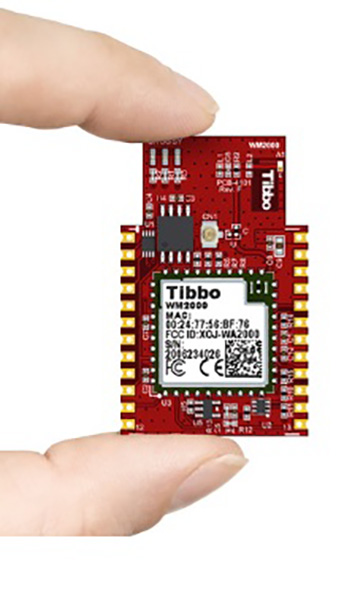WM2000 Programmable Wireless IIoT Module

WM2000 Programmable Wireless IIoT Module
The WM2000 is the first programmable wireless Industrial IoT (IIoT) module offered by Tibbo. This cloud-native device incorporates Wi-Fi (802.11a/b/g/n over 2.4GHz/5GHz) and Bluetooth Low Energy (BLE) interfaces that introduce several new features, such as Wi-Fi auto-connects, wireless debugging, over-the-air (OTA) updates, and TLS support. As a vendor-agnostic module, it can connect your devices with any cloud services provider.
The WM2000's hardware incorporates two high-speed serial ports. It also features software I²C/SPI ports, onboard flash and EEPROM, a real-time clock, and ten GPIO lines — two of which work as external interrupts. Nine lines can be configured to provide pulse-width modulation (PWM) output.
The WM2000 is fully supported by Tibbo IDE (TIDE) and has a dedicated platform that covers all of the module's hardware facilities. The module runs Tibbo OS (TiOS), our highly reliable operating system that achieves exceptional stability thanks to radical OS structure simplification, static memory allocation, full ownership, and meticulous curation of the code base, as well as complete sandboxing of the user's application.
The WM2000 is ideal for creating IIoT solutions that are free from the limitations of traditional wired networks. The simplicity of Tibbo BASIC/C — aided by Cody, our template project generator, and TIDE — ensures timely and cost-effective development of stable, dependable applications.
[WM2000EV Evaluation Kit]
The WM2000EV is a great starting point for evaluating the capabilities of the WM2000, Tibbo's programmable Wi-Fi/BLE module.
The Kit was designed to be completely self-contained and enable the exploration of the module's features without having to wire in any external circuitry. To this end, the board comes equipped with all essential buttons and status LEDs, temperature and light sensors, PWM-controlled RGB LED, as well as the backup battery and the circuitry required to enable the WM2000's low-power mode. The Kit is powered through a USB Type-C connector, which also serves as the wired debugging interface for the WM2000.
The board features a unique lock-and-release mechanism for the WM2000 that provides for effortless removal and insertion of the module: Two rows of horizontal spring-loaded pins hold the module in place while ensuring reliable connections to the module's pins.
Hardware
Specifications:
- Two horizontal rows of spring-loaded pins hold the WM2000 in place
- The module can be easily popped out and popped back in
- temperature sensor
- light sensor
- large RGB LED driven by three PWM-capable lines
- buttons:
- MD — connected to the MD line
- Reset — connected to the RST (reset) line
- status LEDs:
- Green (SG), red (SR), and yellow (SY) main status LEDs
- A blue LED (LPW) indicating if the power is applied to the board
- and test points:
- For measuring the current of the WM2000 and the entire board
- For enabling the low-power mode
- For selecting the RTC power source (3.3V or backup battery)
- 12x2 male pin headers for connecting to external circuitry
- dimensions (L x W x H): 100 x 120 x 27.5mm
- BASIC/C applications can be debugged via Wi-Fi or USB
- USB-C connector for powering the board and for serial debugging
- two-pin terminal block for connecting external 3V–5.5V power*
- CR2032 backup battery (in a holder)
- circuitry required to enable the WM2000's low-power mode
- USB Type-C-to-A cable is included with the Kit
* Only needed if the USB power is not applied
Notes:
- These platform objects are either new or have new features (as compared to the EM2000).
- TLS1.2 with RSA-2048 cryptosystem, supported on a single outgoing TCP connection.
- Function groups: String functions, trigonometric functions, date/time conversion functions, encryption/hash calculation functions, and more
- Variable Types: Byte, char, integer (word), short, dword, long, real, and string, as well as user-defined arrays and structures